At the special invitation from the Turkish Business Angels Association (TBAA), the team of the PanSlovenian Shareholders' Association (VZMD), joined the international delegation of business angels, which visited Albania, Kosovo and the Former Yugoslav Republic of Macedonia, as a focal part of the sixth tour of the VZMD's international business-investor programs, within five days at the end of May 2015. For this purpose, the team of VZMD.tv / investo.TV produced an exclusive VIDEO REPORT on the intensive events. The business delegation entitled »Access to Finance for Start-ups of South-East Europe« consisted of the President and Vice President of TBAA, a representative of the Istanbul stock exchange, managing director of the Technology Park and the Centre for Entrepreneurship of the Technical University in Istanbul, the President of the Business Incubator LabX, and the President of VZMD and a member of the Executive Board of the European Federation of Investors - Better Finance.
Immediately upon arrival in Tirana, the delegation took part in the business breakfast with the Albanian Chamber of Commerce at the Sheraton Hotel, where the representatives of the local business community discussed about the investment climate in Albania. The reception was followed by the meeting with the Vice President of the Turkish Government and diplomatic corps, which was later followed by the reception at the local university, which was also the venue of the round table where the members of delegation presented methods and viewpoints for persuading a business angel to invest in a company.
As a part of the intensive program of the delegation, the VZMD President in Tirana also paid visit to the Summit of the South-East European Cooperation Process, which was visited by the high representatives of 13 countries, EU and OSCE, who addressed crucial issues of the region, among others, the possibilities to strengthen economic cooperation, mutual and foreign investments. On this occasion, Mr. Verbič talked with numerous participants, namely the Minister of Foreign Affairs of Albania and Turkey, Deputy Minister of Foreign Affairs of Macedonia and high representatives of the economy and diplomacy, one of them being the Ambassador of the Republic of Slovenia in Tirana, His Excellency Bojan Bertoncelj. Having visited headquarters of several companies, the delegation stopped by at the Innovation Center of Tirana, which was the venue of the central event of the international community - Startup Grid. The day ended with the gala dinner at Sofra e Ariut, the famous restaurant in Tirana.
During the business breakfast, the chancellor of the University Marin Barleti and the managing director of the Technological Park of the Technical University in Istanbul signed a memorandum, while the participants discussed about the possibilities of collaboration among Istanbul, Albanian and other regional security stock exchanges. After the visit to the Turkish Embassy, the delegation was received by the Albanian Minister of Innovation. The business lunch at the restaurant of the Sky Tower hotel was followed by the meeting with the Albanian-Turkish Chamber of Commerce, and the round table at the School of Economics in Tirana. The visit to Albania ended with a gala dinner, which was attended by over 50 prominent guests, representatives of the politics, the economy, institutions and diplomacy.
At the crack of dawn on the third day, the delegation set off for Kosovo to participate in the international conference of the Kosovo Business Angel Network (KOSBAN). The introductory speech was delivered by the local Ambassadors of Norway and Turkey, where one of the keynote speakers was the Kosovo Minister of Trade and Industry. On this occasion, KOSBAN also signed important Memorandum of collaboration. Beside high representatives of diplomacy and the economy, the conference was also attended by the Ambassador of the Republic of Slovenia in Kosovo, His Excellency Miljan Majhen, who visited the frequented presentation area of VZMD's business-investor programs Invest to Slovenia – investo.si and International Investors` Network – invest-to.net, together with the organizers. The series of events continued at the local Universum College, where the delegation members talked with students about entrepreneurship, innovations and investments as well as potentials and perspectives of Kosovo. The events ended with the five startup pitch presentations from Kosovo and the address of the managing director of the local Innovation Center. The intensive day ended with the gala dinner at the Emirald hotel which, beside 30 prominent guests, was also attended by the local Slovenian Ambassador.
On the fourth day, the delegation headed for Skopje, where the eminent Bushi resort was the venue of the business conference, and thereafter the Memorandum with the government agency for investments »Invest in Macedonia« and the Chamber of Commerce of Macedonia was signed. The events were attended by numerous prominent representatives of the economy, politics and diplomacy who were considerably interested in visiting the presentation area of the VZMD's international business-investor programs. After the business breakfast on the fifth day, the delegation members set off for Tetovo, where the Memorandum of understanding was signed with the local Mayor and the President of the Chamber of Commerce of North-West Macedonia (OEMVP), following the reception organized by the regional business community. Upon signing, a visit was paid to the Technological, industrial and development park of Tetovo (TIDZ) which was presented by the Mayor and the park management.
Therefore, within five days, the business delegation took part in multiple receptions at universities, ministries, innovation centers, business incubators and business breakfasts, lunches and gala dinners, with high representatives of the economy, politics, enterprises and institutions.
The VZMD President, Mr. Kristjan Verbič, joined the delegation from the capital of Azerbaijan, Baku, immediately after the election to the International Fund for Cooperation and Partnership of the Black Sea and the Caspian Sea (BSCSIF), while the journey from Skopje was continued in Paris, where he traditionally participated in the OECD Forum. The extensive, already sixth this year's tour of the international business-investor programs investo.si and invest-to.net was concluded by the VZMD President in Taipei, the capital of Taiwan, by actively participating in the European Commission delegation »Mission for Growth«.
After fruitful presentations in the past two years in Abu Dhabi, Astana, Almaty, Baku, Belgrade, Bled, Bratislava, Brussels, Buenos Aires, Buffalo, Bucharest, Cape Town, Celje, Dubai, Vienna, Eindhoven, Grodno, Helsinki, Istanbul, Yaroslavl, Qatar, Kiev, Copenhagen, Ljubljana, Madrid, Minsk, Montevideo, Moscow, New Delhi, New York, Ouagadougou, Paris, Piran, Praia, Pristina, Reykjavik, Skopje, Tehran, Tirana, Tokyo, Toronto, Warsaw, Vitebsk, Wiesbaden in Zagreb, the international business-investor programs of VZMD continue to provide efficient presence and presentation for its partners on five continents this year as well.








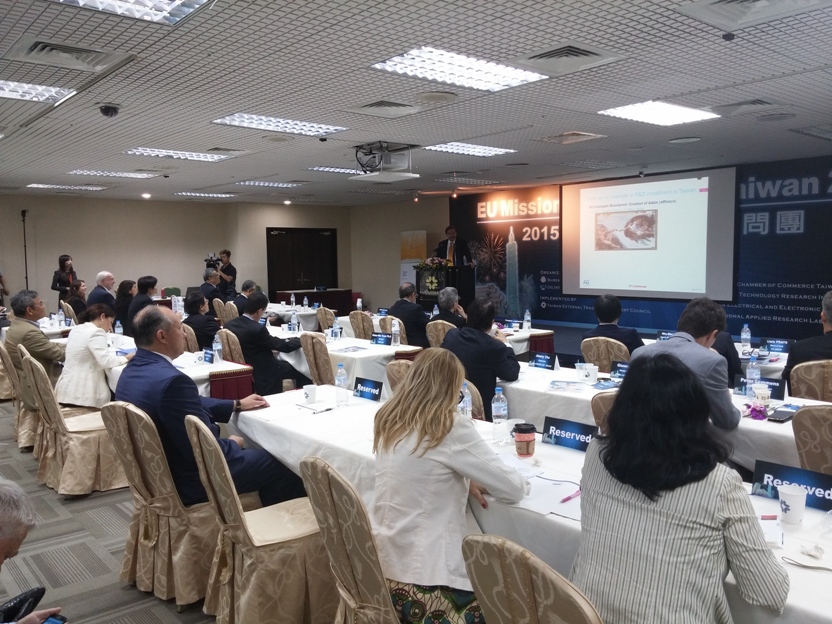 The introductory speech was delivered by the local Minister of the National Development Council, Duh Tyzz-Jiu, which was followed by signing of the Agreement on Cooperation with the Enterprise Europe Network (
The introductory speech was delivered by the local Minister of the National Development Council, Duh Tyzz-Jiu, which was followed by signing of the Agreement on Cooperation with the Enterprise Europe Network (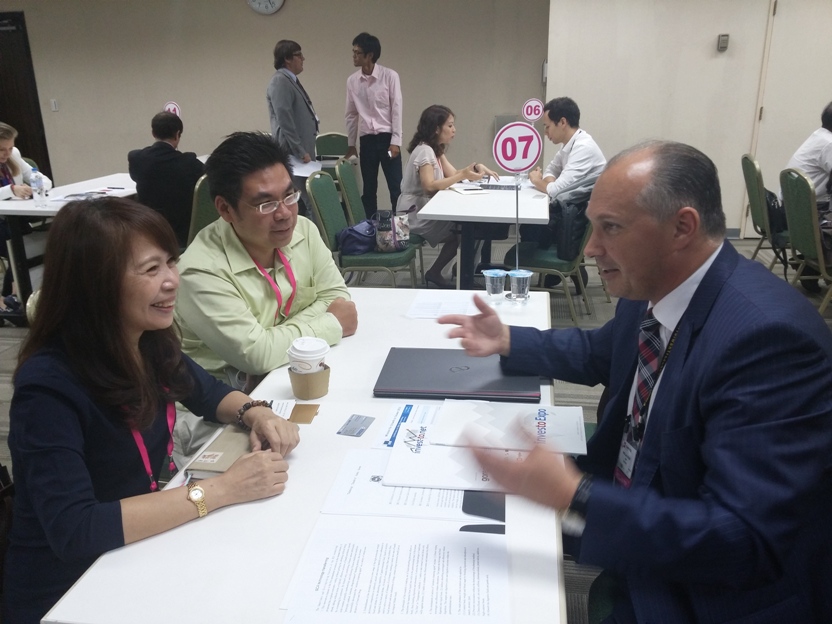 On Friday, the members of the delegation visited the Neihu Technology Park and Delta technology corporation, and thereafter they visited the Computex Taipei 2015, which is the largest Asian fair related to the information and communication technologies.
On Friday, the members of the delegation visited the Neihu Technology Park and Delta technology corporation, and thereafter they visited the Computex Taipei 2015, which is the largest Asian fair related to the information and communication technologies.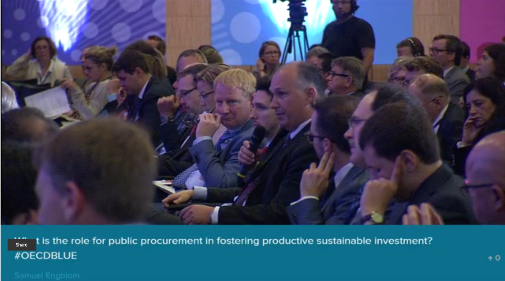
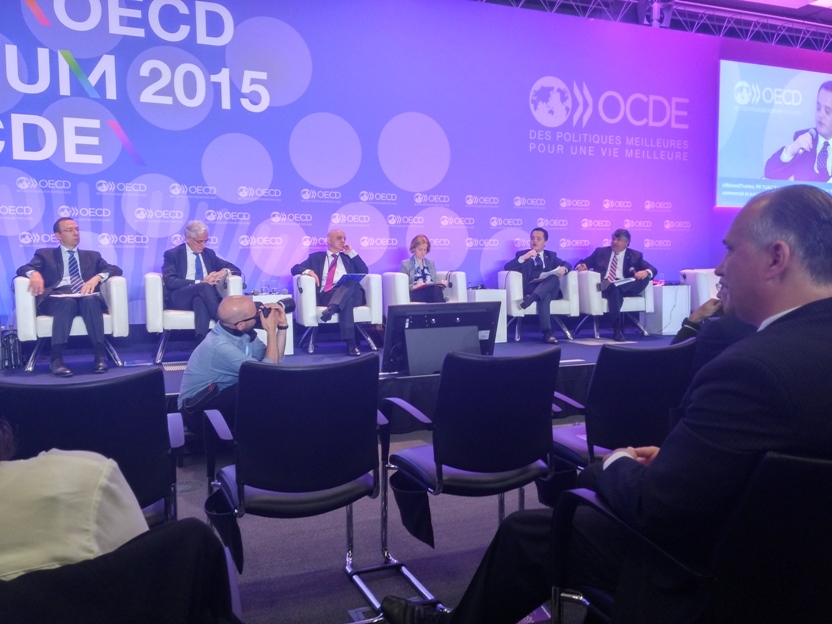 The focal panel was also attended by Mr. Ronald Cohen, President of the G8 Social Impact Investment Taskforce, Arda Ermut, President of the Investment Support and Promotion Agency of Turkey (ISPAT), İlhami Koç, Vice President of Isbank, Eric Labaye, President of McKinsey Global Institute, Richard Trumka, Thierry de Longuemar, Vice President of Finance and Risk Management, Asian Development Bank (ADB), and President of Trade Union Advisory Committee (TUAC), who also commented on the question posed by Mr. Verbič. The latter has participated in the OECD Forum
The focal panel was also attended by Mr. Ronald Cohen, President of the G8 Social Impact Investment Taskforce, Arda Ermut, President of the Investment Support and Promotion Agency of Turkey (ISPAT), İlhami Koç, Vice President of Isbank, Eric Labaye, President of McKinsey Global Institute, Richard Trumka, Thierry de Longuemar, Vice President of Finance and Risk Management, Asian Development Bank (ADB), and President of Trade Union Advisory Committee (TUAC), who also commented on the question posed by Mr. Verbič. The latter has participated in the OECD Forum 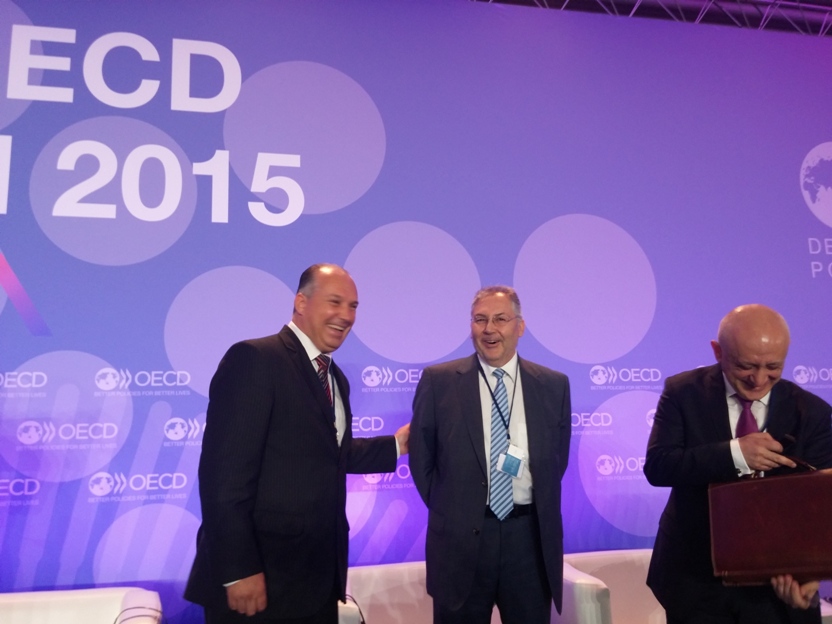 Under the
Under the  Pursuant to the Rules and Regulations of the Ljubljana Stock Exchange, d.d, and the relevant legislation, the company Poslovni sistem Mercator, d.d., hereby informs the shareholders and the public of the following:
Pursuant to the Rules and Regulations of the Ljubljana Stock Exchange, d.d, and the relevant legislation, the company Poslovni sistem Mercator, d.d., hereby informs the shareholders and the public of the following:
 The speakers from Austria, Belgium, France, Italy, Japan, Canada, Germany, Netherlands, Spain, United Kingdom and USA talked about multiple legal proceedings which they had come up against as investors representatives. On this occasion Mr. Verbič, as a part of the discussion led by the former President of the European Parliament. Mr. Jose Maria Gil Robles, stressed the importance of trust of investors and anew brought attention to the cases of expropriated investors in banks, where the former holders of bonds and shares of Slovenian banks belong.
The speakers from Austria, Belgium, France, Italy, Japan, Canada, Germany, Netherlands, Spain, United Kingdom and USA talked about multiple legal proceedings which they had come up against as investors representatives. On this occasion Mr. Verbič, as a part of the discussion led by the former President of the European Parliament. Mr. Jose Maria Gil Robles, stressed the importance of trust of investors and anew brought attention to the cases of expropriated investors in banks, where the former holders of bonds and shares of Slovenian banks belong.  The conference attendees also discussed about new raising capital models such as "crowdfunding" as well as new communication models, connections and relationships among individual investors. The VZMD President joined the working lunch at the headquarters of Cremades & Calvo-Sotelo, where the Executive Board of IFLN mapped out the strategy of future activities. In the evening, the most prominent guests and participants headed for the renown palace El Escorial for informal gathering. The high visibility conference ended last night, with the prize-awarding ceremony for the »Shareholders-friendly Award«, which was received by the Repsol company. Such awards were also received by the two Slovenian companies in 2011 and 2012 (
The conference attendees also discussed about new raising capital models such as "crowdfunding" as well as new communication models, connections and relationships among individual investors. The VZMD President joined the working lunch at the headquarters of Cremades & Calvo-Sotelo, where the Executive Board of IFLN mapped out the strategy of future activities. In the evening, the most prominent guests and participants headed for the renown palace El Escorial for informal gathering. The high visibility conference ended last night, with the prize-awarding ceremony for the »Shareholders-friendly Award«, which was received by the Repsol company. Such awards were also received by the two Slovenian companies in 2011 and 2012 (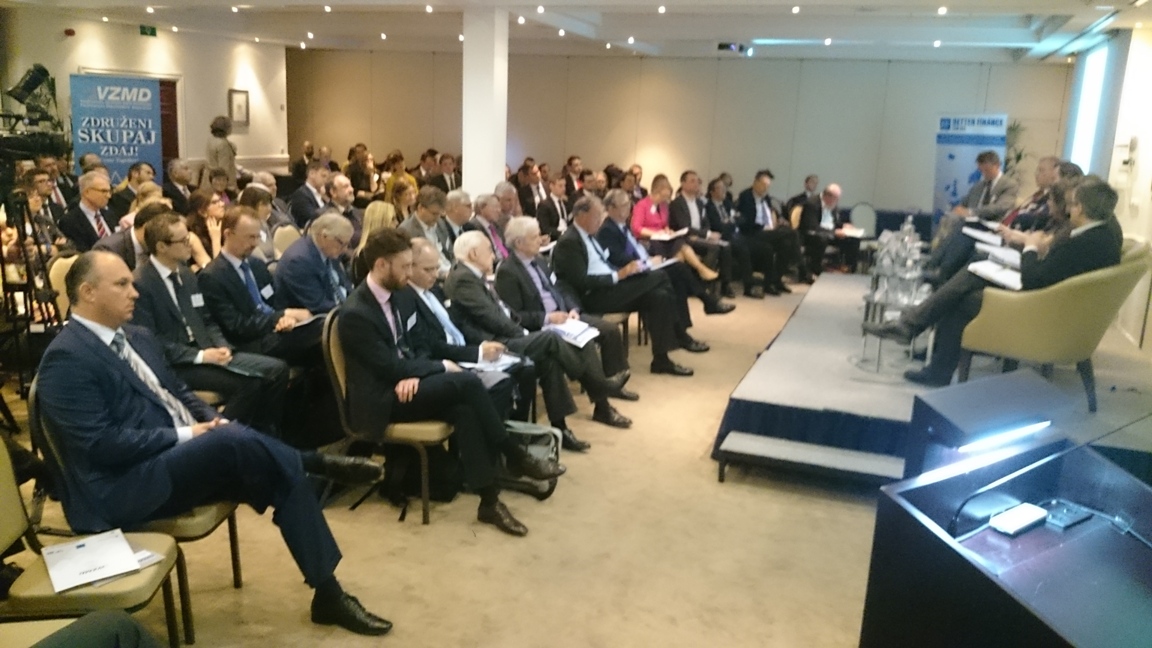
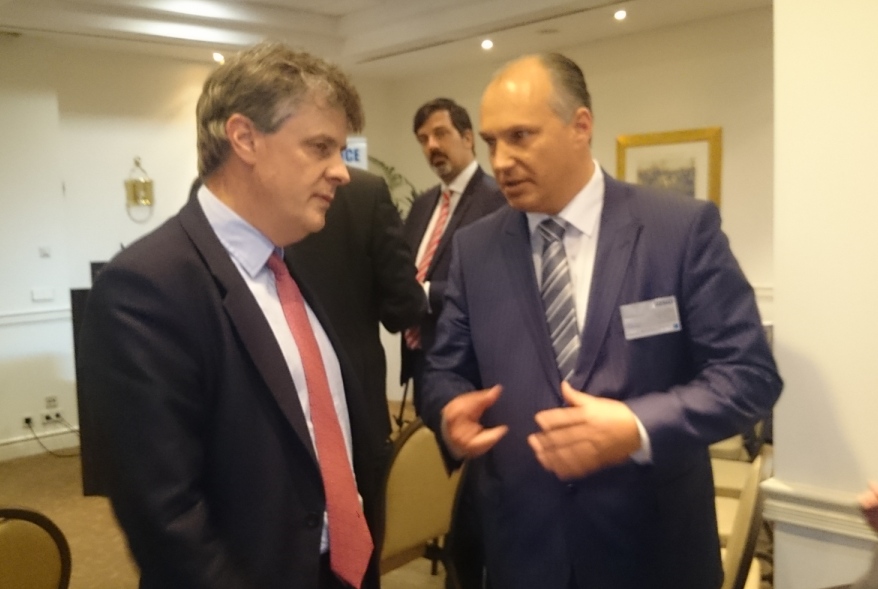 As part of
As part of  This conference organized by Better Finance which addressed the issue - by all means also applicable to the circumstances in the Republic of Slovenia - how to attract savings to capital markets and real investments, was attended by numerous prominent guests, among others members of the European Parliament , representatives of the European Commission and influential international associations. One of the round tables was the place where the members of the European Parliament: Philippe de Backer (ALDE), Markus Ferber (EPP), Elisa Ferreira (S&D), Sven Giegold (European Greens) and Morten Messerschmidt (ECR) expressed their viewpoints, the participants were addressed by Mr. Jonathan Hill, European Commissioner for Financial Stability, Financial Services and Capital Markets Union (talking to Mr. Verbič in the photo).
This conference organized by Better Finance which addressed the issue - by all means also applicable to the circumstances in the Republic of Slovenia - how to attract savings to capital markets and real investments, was attended by numerous prominent guests, among others members of the European Parliament , representatives of the European Commission and influential international associations. One of the round tables was the place where the members of the European Parliament: Philippe de Backer (ALDE), Markus Ferber (EPP), Elisa Ferreira (S&D), Sven Giegold (European Greens) and Morten Messerschmidt (ECR) expressed their viewpoints, the participants were addressed by Mr. Jonathan Hill, European Commissioner for Financial Stability, Financial Services and Capital Markets Union (talking to Mr. Verbič in the photo).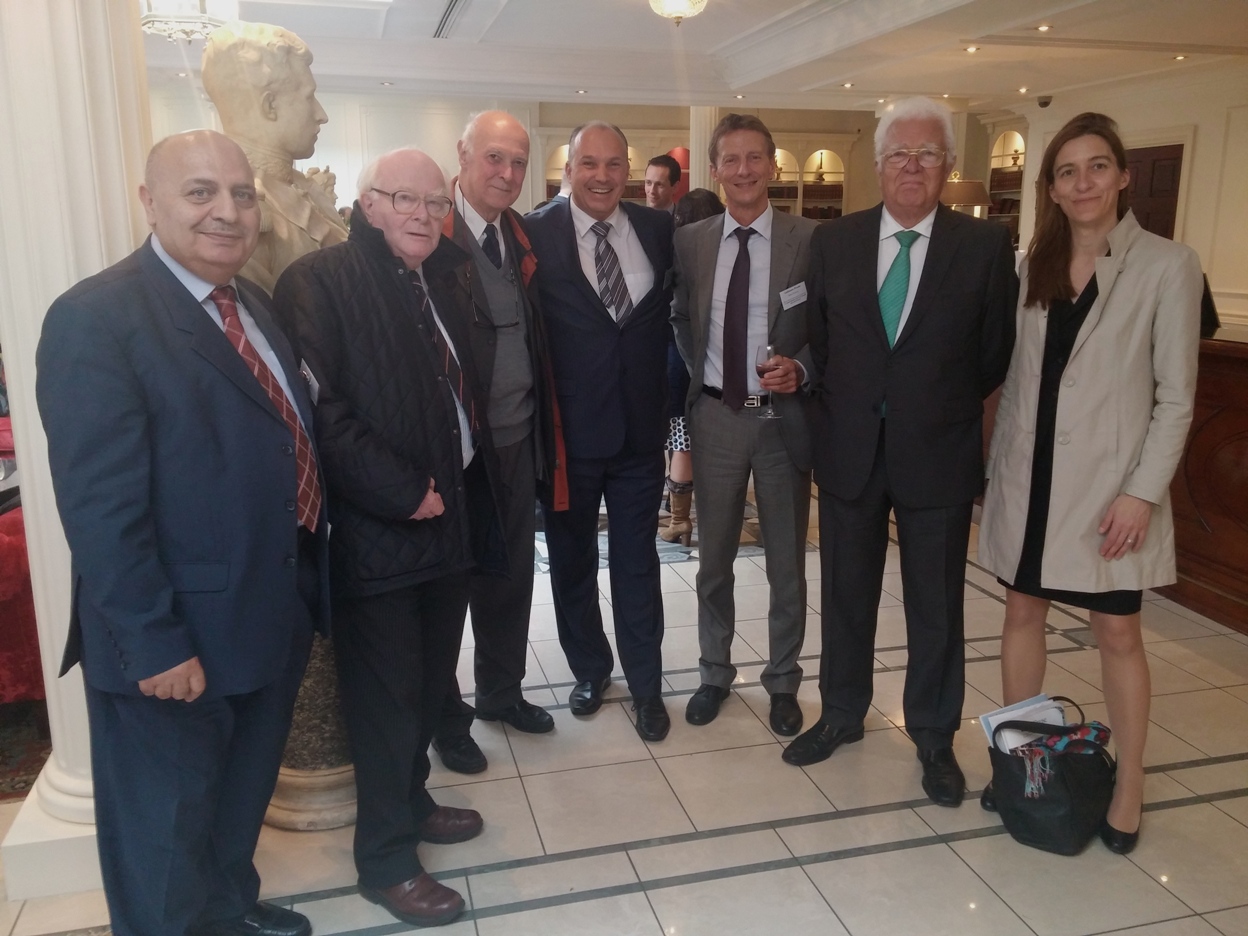 The numerous prominent guests participated both in the conference and the evening's reception of the Federation of European Securities Exchange, among others the members of the European Parliament: Markus Ferber, Othmar Karas, Georgios Kyrtsos, Petr Jezek, Michael Theurer, Cora van Nieuwenhuizen, Sirpa Pietikäinen and Beatrix von Storch, representatives of stock exchanges Athens Exchange Group, Bolsas y Mercados Españoles, Bucharest Stock Exchange, Budapest Stock Exchange, Deutsche Börse, Euronext, Irish Stock Exchange, London Metal Exchange, Luxembourg Stock Exchange, Nasdaq, Oslo Stock Exchange, SIX Swiss Exchange, Vienna Stock Exchange in Warsaw Stock Exchange, as well as representatives of the organizations Better Finance, European Fund and Asset Management Association (EFAMA), EuropeanIssuers, European Federation of Accountants and many others.
The numerous prominent guests participated both in the conference and the evening's reception of the Federation of European Securities Exchange, among others the members of the European Parliament: Markus Ferber, Othmar Karas, Georgios Kyrtsos, Petr Jezek, Michael Theurer, Cora van Nieuwenhuizen, Sirpa Pietikäinen and Beatrix von Storch, representatives of stock exchanges Athens Exchange Group, Bolsas y Mercados Españoles, Bucharest Stock Exchange, Budapest Stock Exchange, Deutsche Börse, Euronext, Irish Stock Exchange, London Metal Exchange, Luxembourg Stock Exchange, Nasdaq, Oslo Stock Exchange, SIX Swiss Exchange, Vienna Stock Exchange in Warsaw Stock Exchange, as well as representatives of the organizations Better Finance, European Fund and Asset Management Association (EFAMA), EuropeanIssuers, European Federation of Accountants and many others. The event in Brussels was also followed by the team of
The event in Brussels was also followed by the team of 





